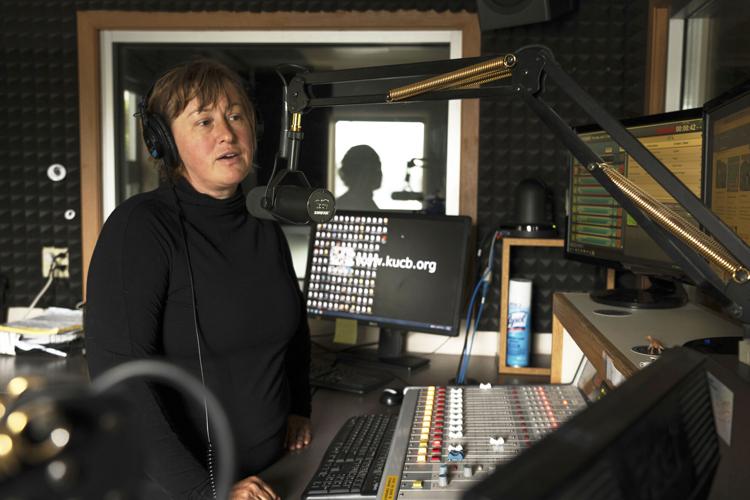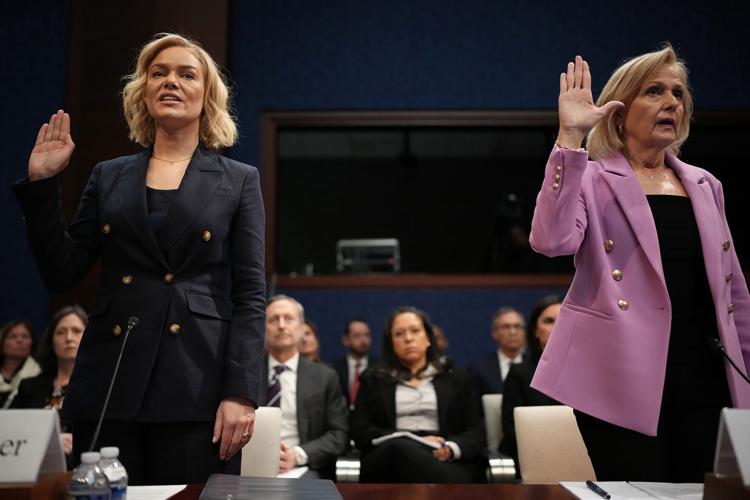ANCHORAGE, Alaska — Lauren Adams, general manager for KUCB public radio in Unalaska, Alaska, didn't have much time to reflect on Congress, 4,000 miles away, stripping federal funding for public media this week. She was too busy working.
Sirens blared in the Aleutian Islands community Wednesday warning of a potential tsunami, with a voice over public loudspeakers urging the community's 4,100 residents to seek higher ground immediately and tune into the radio — to Adams' station.
At the same time in Washington, the Senate was voting on a measure that would eliminate almost $1.1 billion that already was appropriated for NPR and PBS — a process that didn't end until early Thursday morning. The House completed the process in time for President Donald Trump to sign it before a Friday deadline.
Trump called for the cuts, saying public media's news programming was biased against him and fellow Republicans, and threatened GOP members of Congress with primary challenges if they didn't fall in line.
People are also reading…

Lauren Adams, general manager of public radio station KUCB, works Thursday in the broadcast studio in Unalaska, Alaska.Â
Adams, her news director, a reporter and an intern kept broadcasting and updating KUCB's social media feed until the danger passed. Then she made time for one more task — texting U.S. Sen. Lisa Murkowski and urging her to vote against the bill. Murkowski was one of two Republican senators, along with Susan Collins of Maine, to publicly dissent.
"I thought that it was such a telling story of why her constituents have a different relationship to public radio than maybe some other regions of the United States," Adams said.
Hard decisions aheadÂ
The federal money is appropriated to the Corporation for Public Broadcasting, which distributes it to NPR and PBS. About 70% of the money goes directly to the 330 PBS and 246 NPR stations across the country, though that's only a shorthand way to describe its potential impact.
The cuts are expected to weigh most heavily on smaller public media outlets away from big cities, and it's likely some won't survive. Katherine Maher, NPR's president and CEO, estimated as many as 80 NPR stations could face closure in the next year. Some stations are already fielding offers from commercial entities to buy their broadcast licenses, she said.
"Many of our stations which provide access to free unique local programming and emergency alerts will now be forced to make hard decisions in the weeks and months ahead," said Paula Kerger, PBS president and CEO. "There is nothing more American than PBS. Despite today's setback, we are determined to keep fighting to preserve the essential services we provide to the American public."

President and CEO of National Public Radio Katherine Maher, left, and President and CEO of Public Broadcasting Service Paula Kerger are sworn in March 26Â before a House Oversight and Government Reform Committee hearing at the U.S. Capitol in Washington.Â
The measure will cost PBS and NPR stations in Mississippi about $2 million, about 15% of the budget, said Royal Aills, executive director of Mississippi Public Broadcasting.
Already, Mississippi Public Broadcasting decided to eliminate a streaming channel that airs children's programming like "Caillou" and "Daniel Tiger's Neighborhood" to the state's youngsters 24 hours a day, said Taiwo Gaynor, the system's chief content officer.
"This is important for families, to have access to content that they don't have to pay for," Gaynor said. "That is a sad thought, to think that we … might not be able to provide that for a generation of children."
Maine's public media system is looking at a hit of $2.5 million, or about 12% of its budget, for the next fiscal year, said Rick Schneider, president and chief executive officer of Maine Public. He said he's not ready to identify specific cuts, but the system is preparing to reinvent itself to make certain it continues serving the state's residents.
Maine's rural residents rely heavily on public media for weather updates and disaster alerts, said Molly Curren Rowles, executive director of ACLU of Maine. Rowles said public media was a "lifeline" to her growing up off the grid.

Brian Venua, a reporter at the public radio station KMXT, works Thursday in Kodiak, Alaska.
Bracing for troubleÂ
NPR's Maher fears what the cuts might mean for the system's journalism, not just in rural areas where local news can be hard to come by, but in telling the rest of the country what is going on there. Less funding will also mean less support for popular television and radio programming, though it's too soon to tell which programs will be affected.
NPR stations also use millions of dollars in federal money to pay music licensing fees. Now many will have to renegotiate these deals, which could mean less music, or a more limited variety of music, on outlets where music discovery is a big part of their identity.
For example, Maher estimates that some 96% of all classical music broadcast in the United States is on NPR stations. "That is essentially taking an entire art form out of public access," she said.
The affair transcends violins and piccolos. NPR received support Thursday from the heavy metal band Gwar, whose lead singer Blothar the Berserker posted a call on social media for fans to pay attention to what is going on with public media.
Already, public media is seeing an increase in donations from readers and viewers to support its mission, and stations are actively sounding the alarm. In a plea to listeners on its website Thursday, Philadelphia's WXPN radio pointed to its legacy in helping people discover new music.
"The most important thing you can do is support WXPN and the public media system in a way that is meaningful to you," the station urged on its website.
Public media isn't getting any help from states, either. At least five states reduced their own outlays for public media this year, either for budget or political reasons.

















